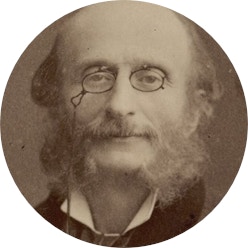
Жак Оффенбах
20 июня 1819 г. - Cologne (Germany) — 5 октября 1880 г. - Paris (France)
About
Родившись в Германии в семье музыканта, Якоб Оффенбах (позже «Жак») начал свои музыкальные занятия на виолончели, изначально практикуясь втайне из-за опасений родителей, что он слишком мал для этого инструмента. Его талант в конечном итоге убедил их в обратном: когда ему было 14 лет, они отправили его на прослушивание в Парижскую консерваторию, которая приняла его, несмотря на правило, запрещающее иностранцам поступать. Тем не менее, всего через год он внезапно прервал свои занятия, чтобы продолжить карьеру исполнителя, присоединившись к оркестру Оперы-Комик и встретив композитора оперы Галеви, который согласился давать ему уроки композиции. После короткого перерыва в Кёльне во время революционного движения 1848 года, в 1850 году он вернулся в Париж и ему предложили руководство Комеди-Франсез.
К 1855 году он снова был в движении, открыв свой собственный театр, Театр Буфф-Паризьен, на Елисейских полях. Там он создал новый, сильно сатирический музыкально-театральный жанр, и с отменой строгих правительственных цензурных практик в конце 1850-х годов он вскоре начал свободно выражать себя с длинной чередой невероятно популярных хитов. Именно его Орфей в аду 1858 года задал тон комическим операм и опереттам, которые последовали (в частности, Великая герцогиня Герольштейнская, Парижская жизнь, Бандиты, «опера-буфф-феерия» Король Морковь и патриотическая опера Дочь барабанщика). Его карьера завершилась его смертью всего за несколько месяцев до премьеры его вечного оперного шедевра Сказки Гофмана («The Tales of Hoffmann»), который продолжает завораживать зрителей и критиков по всему миру и по сей день.

